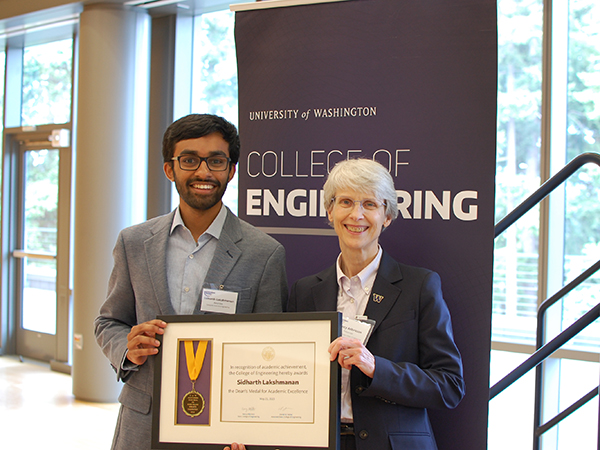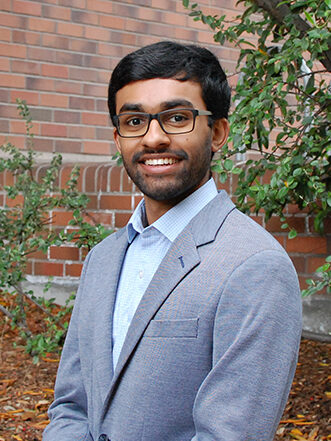Singing in the University Chorale helped Sidharth Lakshmanan, a student in the Allen School’s fifth-year master’s program, become a better coder. Finding the right key, he found, was all about teamwork.
“Choir has helped me realize that when every part works together in harmony — no pun intended — the end result is often so much better than if only one of those parts is very strong,” he said. “This has improved me as a computer scientist because I find that I am learning to strike a balance between readability and performance in the code I write.”
The multitalented Lakshmanan has put collaboration center stage during his time at the University of Washington. Having obtained his bachelor’s degree from the Allen School in March, he was recently awarded the College of Engineering Dean’s Medal for Academic Excellence in recognition of both his scholarship and his contributions to the broader computer science and engineering community.
“Receiving this award means a lot to me because this award represents all of the hard work I have put into each and every day at UW,” he said. “But I would not be where I am without the support of my amazing family, friends and mentors! Each and every one of them have been super supportive, carrying me through times of need. This award represents my thankfulness to those who supported me along the way.”
When he’s not singing in the choir, Lakshmanan directs his attention to a number of projects in computer science and mentorship. From the start of his research journey, he said, his goal was to make a positive impact in the lives of others. For instance, through his work with the Allen School’s Makeability Lab led by professor Jon Froehlich, he helped develop Project Sidewalk, a crowd-sourcing application that allows users to classify sidewalks and make cities more accessible. He implemented and deployed a validation schema to more than 10 cities that allowed users to vote on classifications, helping make the data more robust.
Lakshmanan subsequently joined the Molecular Information Systems Lab, where he is currently leading a research project on the structural embedding for protein sequences using machine learning techniques in collaboration with MISL co-director Jeff Nivala and Ph.D. student Phil Leung. The team has submitted a paper to the 2023 International Conference on Learning Representations and is in the revision process.
“Though I do not come from a biology background,” Lakshmanan said, “the machine learning challenges of this application fascinate me.”
Lakshmanan also joined SAMPL where he contributed to a project led by professor Luis Ceze and Ph.D. student Zihao Ye on Sparse Tensor IR, a compilation abstraction that offers composable formats and composable transformations for deep learning workloads. As part of the research, Lakshmanan wrote data-dependent GPU kernels to be able to outperform current state-of-the-art libraries.
Besides his research efforts, Lakshmanan was also one of the first 10 members of the Husky Coding Project, a club on campus that gives people of all majors and academic backgrounds an opportunity to work on a large-scale, coding-related team project for an entire year. He is now an education and technology lead of the club and has helped it grow to more than 80 members.
“We often hear ‘you need experience to gain experience,’ meaning that it is difficult for students early in their UW careers and non-computer science majors to get software internships,” he said. “I am really proud of the club’s mission to expand opportunities in this space, so this is one of my main extracurriculars that I spend my time on.”

Among his schoolwork, his varied research projects and helping lead the Husky Coding Project, he’s found time to participate in the University Chorale. The UW choir gives him another creative outlet, he said, one that allows him to access a different part of his brain. But coding and choir connect in more ways than one, he added, especially when it comes to working together for a better outcome.
“One of the things I love about choir is that every section is like its own team that needs to coordinate both internally and externally,” he said. “So often, it is not ‘how do I sound?’, it is more ‘how do we sound, and how am I a part of that sound?’ ”
Whether with chords or with code, Lakshmanan continues to seek harmony wherever he goes. He will take that mindset to internships with Palantir and SpaceX later this year, and continue with his master’s studies at UW, where time, he said, has flown by.
“I loved that every time I would start translating my thoughts to code or singing with the choir, I would enter a flow state that would turn hours to minutes,” he said, smiling. “This is why I came to this field and to UW.”


